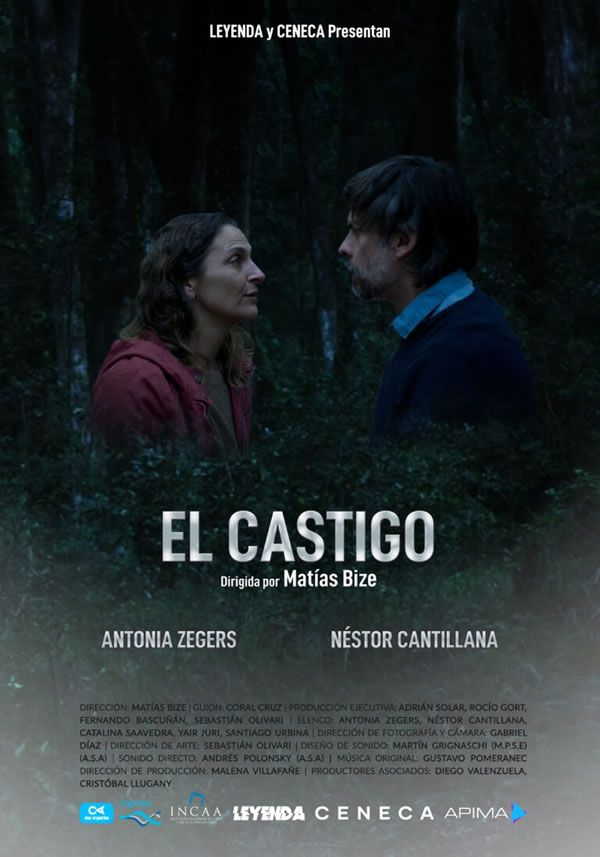08/22/2023
Review 'The Punishment': The Role of the Mother and the Male Figure in this Contemporary Reflection by Matías Bize
By Daniel Ruiz, (Twitter: @tatoruiz), accredited by CineVista at the Lima Film Festival
A married couple - Ana (Antonia Zegers) and Mateo (Néstor Cantillana) - ventures into a forest in southern Chile in search of their 7-year-old son, who got lost just a few minutes ago. The father appears desperate, extremely worried, while she, no less uneasy, takes on the role of the challenging mother, with a strong belief that their son is playing a prank on them. A very heavy one, indeed. As the minutes pass, the child provides no explanation or clue. The night is approaching, and the anguish grows stronger.
In "The Punishment," information is gradually and sparingly revealed, which is effective in keeping the audience in suspense. The disappearance of the child in a matter of minutes - as affirmed by the parents themselves - has no simple explanation or mere coincidence. The terror, evident on the faces of both parents, also manifests through the damp and cold forest, a third character equally overwhelming to the situation, a space that embodies fear, abandonment, and helplessness, themes that seem to revolve around the film, at least during the first half-hour.

The situation and part of the truth behind the incident begin to unravel when the worried father calls the police, led by a stern and accusatory woman (Catalina Saavedra) who, like us, the audience, seems to have excessive doubts regarding the situation. Gradually, she starts identifying a sort of clues that expose not only the parents but especially the mother, who with certain specific actions and the pseudo-confidence with which she predicts that everything is a possible prank by her son, begins to appear threatening.
Chilean director Matías Bize's latest work takes us back into dark and murky territory through the performances of an exceptional pair of actors. Years after his debut ("Saturday," 2002), he once again employs the long take technique, a resource that at times adds significantly to the sense of unease already embedded in the screenplay written by Spanish writer Coral Cruz.
This being the director's ninth feature film, he skillfully maintains attention and tension. The uncertainty and the clues provided about the family's past, and about that woman - the mother - are undeniably fascinating and leave little to no room for boredom. With "The Punishment," Bize aims to reflect on women's fears related to motherhood and all the work they've done in that sphere, as well as to critically examine how male figures accompany the role of mother. In other words, it's a thoroughly contemporary reflection on family and its responsibilities.

"El Castigo" is an absorbing, captivating, and entirely convincing film, even though I believe that at the end of its third act, its screenwriter and director seem to want to overly explain the underlying theme, as if distrusting the intelligence of their audience.
"El Castigo" concludes with a thematic emphasis that doesn't necessarily ruin the positive experience of its first two parts but does leave a somewhat bitter taste regarding the need to underscore an issue as contemporary and urgent, yet constant. The extended monologue of its protagonist - truly powerful, nonetheless - seems driven by proselytism and pedagogy, and it leaves us - or at least me - wanting to have ended with something much more subtle and insightful; with one of those gifts that good cinema sometimes offers us: the need to engage our minds much further.
Technical Information
-
Director: Matías Bize
-
Screenplay: Coral Cruz
-
Duration: 86 minutes
-
Producers: Adrián Solar
-
Genre: Drama
-
Cast: Antonia Zegers, Néstor Cantillana, Catalina Saavedra, Yair Juri, Santiago Urbina, Osqui Guzmán, Julieta Zylberberg, Sebastián Molinaro
-
Editing: Rodrigo Saquel
-
Cinematography: Gabriel Díaz
-
Music: Gustavo Pomenarec
-
Country: Chile, Argentina
-
Year: 2022
<< Go to Spanish version
